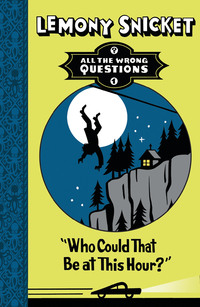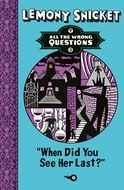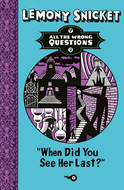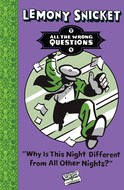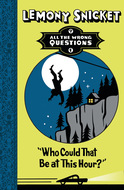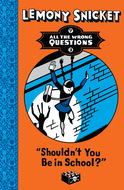Raamatut ei saa failina alla laadida, kuid seda saab lugeda meie rakenduses või veebis.
Loe raamatut: «Who Could That Be at This Hour?»


EGMONT
Who Could That Be at This Hour?
First published in Great Britain 2012
by Egmont UK Limited
The Yellow Building
1 Nicholas Road
London W11 4AN
Text copyright © 2012 Lemony Snicket
Art copyright © 2012 Seth
ALL THE WRONG QUESTIONS: Who Could That Be at This Hour?
by Lemony Snicket reprinted by arrangement with Charlotte Sheedy Literary Agency.
Art by Seth reprinted by arrangement with Little, Brown and Company Hachette Book Group / 237 Park Avenue, New York, NY 10017.
The moral rights of the author and artist have been asserted.
ISBN: 978 1 4052 5621 6
eISBN: 978 1 7803 1365 8
A CIP catalogue record for this book is available from the British Library
All rights reserved. No part of this publication may be reproduced, stored in a retrieval system, or transmitted, in any form or by any means, or stored in a database or retrieval system, without the prior written permission of the publisher.


TO: Walleye
FROM: LS
FILE UNDER: Stain’d-by-the-Sea,
accounts of; theft, investigations of; Hangfire; hawsers; ink; double-crossings; et cetera
1/4
cc: VFDhq
Contents
Cover
Title page
Copyright
Dedication
CHAPTER ONE
CHAPTER TWO
CHAPTER THREE
CHAPTER FOUR
CHAPTER FIVE
CHAPTER SIX
CHAPTER SEVEN
CHAPTER EIGHT
CHAPTER NINE
CHAPTER TEN
CHAPTER ELEVEN
CHAPTER TWELVE
CHAPTER THIRTEEN
Author biography


CHAPTER ONE
There was a town, and there was a girl, and there was a theft. I was living in the town, and I was hired to investigate the theft, and I thought the girl had nothing to do with it. I was almost thirteen and I was wrong. I was wrong about all of it. I should have asked the question “Why would someone say something was stolen when it was never theirs to begin with?” Instead, I asked the wrong question—four wrong questions, more or less. This is the account of the first.
The Hemlock Tearoom and Stationery Shop is the sort of place where the floors always feel dirty, even when they are clean. They were not clean on the day in question. The food at the Hemlock is too awful to eat, particularly the eggs, which are probably the worst eggs in the entire city, including those on exhibit at the Museum of Bad Breakfast, where visitors can learn just how badly eggs can be prepared. The Hemlock sells paper and pens that are damaged and useless, but the tea is drinkable, and the place is located across the street from the train station, so it is an acceptable place to sit with one’s parents before boarding a train for a new life. I was wearing the suit I’d been given as a graduation present. It had hung in my closet for weeks, like an empty person. I felt glum and thirsty. When the tea arrived, for a moment the steam was all I could see. I’d said good-bye to someone very quickly and was wishing I’d taken longer. I told myself that it didn’t matter and that certainly it was no time to frown around town. You have work to do, Snicket, I told myself. There is no time for moping.
You’ll see her soon enough in any case, I thought, incorrectly.
Then the steam cleared, and I looked at the people who were with me. It is curious to look at one’s family and try to imagine how they look to strangers. I saw a large-shouldered man in a brown, linty suit that looked like it made him uncomfortable, and a woman drumming her fingernails on the table, over and over, the sound like a tiny horse’s galloping. She happened to have a flower in her hair. They were both smiling, particularly the man.
“You have plenty of time before your train, son,” he said. “Would you like to order something to eat? Eggs?”
“No, thank you,” I said.
“We’re both so proud of our little boy,” said the woman, who perhaps would have looked nervous to someone who was looking closely at her. Or perhaps not. She stopped drumming her fingers on the table and ran them through my hair. Soon I would need a haircut. “You must be all a-tingle with excitement.”
“I guess so,” I said, but I did not feel a-tingle. I did not feel a-anything.
“Put your napkin in your lap,” she told me.
“I did.”
“Well, then, drink your tea,” she said, and another woman came into the Hemlock. She did not look at me or my family or anywhere at all. She brushed by my table, very tall, with a very great deal of very wild hair. Her shoes made noise on the floor. She stopped at a rack of envelopes and grabbed the first one she saw, tossing a coin to the woman behind the counter, who caught it almost without looking, and then she was back out the door. With all the tea on all the tables, it looked like one of her pockets was steaming. I was the only one who had noticed her. She did not look back.
There are two good reasons to put your napkin in your lap. One is that food might spill in your lap, and it is better to stain the napkin than your clothing. The other is that it can serve as a perfect hiding place. Practically nobody is nosy enough to take the napkin off a lap to see what is hidden there. I sighed deeply and stared down at my lap, as if I were lost in thought, and then quickly and quietly I unfolded and read the note the woman had dropped there.
CLIMB OUT THE WINDOW IN THE BATHROOM AND MEET ME IN THE ALLEY BEHIND THIS SHOP. I WILL BE WAITING IN THE GREEN ROADSTER. YOU HAVE FIVE MINUTES. —S
“Roadster,” I knew, was a fancy word for “car,” and I couldn’t help but wonder what kind of person would take the time to write “roadster” when the word “car” would do. I also couldn’t help but wonder what sort of person would sign a secret note, even if they only signed the letter S. A secret note is secret. There is no reason to sign it.
“Are you OK, son?”
“I need to excuse myself,” I said, and stood up. I put the napkin down on the table but kept the note crumpled up in my hand.
“Drink your tea.”
“Mother,” I said.
“Let him go, dear,” said the man in the brown suit. “He’s almost thirteen. It’s a difficult age.”
I stood up and walked to the back of the Hemlock. Probably one minute had passed already. The woman behind the counter watched me look this way and that. In restaurants they always make you ask where the bathroom is, even when there’s nothing else you could be looking for. I told myself not to be embarrassed.
“If I were a bathroom,” I said to the woman, “where would I be?”
She pointed to a small hallway. I noticed the coin was still in her hand. I stepped quickly down the hallway without looking back. I would not see the Hemlock Tearoom and Stationery Shop again for years and years.
I walked into the bathroom and saw that I was not alone. I could think of only two things to do in a bathroom while waiting to be alone. I did one of them, which was to stand at the sink and splash some cold water on my face. I took the opportunity to wrap the note in a paper towel and then run the thing under the water so it was a wet mess. I threw it away. Probably nobody would look for it.
A man came out of the stall and caught my eye in the mirror. “Are you all right?” he asked me. I must have looked nervous.
“I had the eggs,” I said, and he washed his hands sympathetically and left. I turned off the water and looked at the only window. It was small and square and had a very simple latch. A child could open it, which was good, because I was a child. The problem was that it was ten feet above me, in a high corner of the bathroom. Even standing on tiptoes, I couldn’t reach the point where I’d have to stand if I wanted to reach the point to open the latch. Any age was a difficult age for someone needing to get through that window.
I walked into the bathroom stall. Behind the toilet was a large parcel wrapped in brown paper and string, but wrapped loosely, as if nobody cared whether you opened it or not. Leaned up against the wall like that, it didn’t look interesting. It looked like something the Hemlock needed, or a piece of equipment a plumber had left behind. It looked like none of your business. I dragged it into the middle of the stall and shut the door behind me as I tore open the paper. I didn’t lock it. A man with large shoulders could force open a door like that even if it were locked.
It was a folding ladder. I knew it was there. I’d put it there myself.
It was probably one minute to find the note, one to walk to the bathroom, one to wait for the man to leave, and two to set up the ladder, unlatch the window, and half-jump, half-slide out the window into a small puddle in the alley. That’s five minutes. I brushed muddy water off my pants. The roadster was small and green and looked like it had once been a race car, but now it had cracks and creaks all along its curved body. The roadster had been neglected. No one had taken care of it, and now it was too late. The woman was frowning behind the steering wheel when I got in. Her hair was now wrestled into place by a small leather helmet. The windows were rolled down, and the rainy air matched the mood in the car.
“I’m S. Theodora Markson,” she said.
“I’m Lemony Snicket,” I said, and handed her an envelope I had in my pocket. Inside was something we called a letter of introduction, just a few paragraphs describing me as somebody who was an excellent reader, a good cook, a mediocre musician, and an awful quarreler. I had been instructed not to read my letter of introduction, and it had taken me some time to slip the envelope open and then reseal it.
“I know who you are,” she said, and tossed the envelope into the backseat. She was staring through the windshield like we were already on the road. “There’s been a change of plans. We’re in a great hurry. The situation is more complicated than you understand or than I am in a position to explain to you under the present circumstances.”
“Under the present circumstances,” I repeated. “You mean, right now?”
“Of course that’s what I mean.”
“If we’re in a great hurry, why didn’t you just say ‘right now’?”
She reached across my lap and pushed open the door. “Get out,” she said.
“What?”
“I will not be spoken to this way. Your predecessor, the young man who worked under me before you, he never spoke to me this way. Never. Get out.”
“I’m sorry,” I said.
“Get out.”
“I’m sorry,” I said.
“Do you want to work under me, Snicket? Do you want me to be your chaperone?”
I stared out at the alley. “Yes,” I said.
“Then know this: I am not your friend. I am not your teacher. I am not a parent or a guardian or anyone who will take care of you. I am your chaperone, and you are my apprentice, a word which here means ‘person who works under me and does absolutely everything I tell him to do.’”
“I’m contrite,” I said, “a word which here means—”
“You already said you were sorry,” S. Theodora Markson said. “Don’t repeat yourself. It’s not only repetitive, it’s redundant, and people have heard it before. It’s not proper. It’s not sensible. I am S. Theodora Markson. You may call me Theodora or Markson. You are my apprentice. You work under me, and you will do everything I tell you to do. I will call you Snicket. There is no easy way to train an apprentice. My two tools are example and nagging. I will show you what it is I do, and then I will tell you to do other things yourself. Do you understand?”
“What’s the S stand for?”
“Stop asking the wrong questions,” she replied, and started the engine. “You probably think you know everything, Snicket. You are probably very proud of yourself for graduating, and for managing to sneak out of a bathroom window in five and a half minutes. But you know nothing.”
S. Theodora Markson took one of her gloved hands off the steering wheel and reached up to the dashboard of the roadster. I noticed for the first time a teacup, still steaming. The side of the cup read HEMLOCK.
“You probably didn’t even notice I took your tea, Snicket,” she said, and then reached across me and dumped the tea out the window. It steamed on the ground, and for a few seconds we watched an eerie cloud rise into the air of the alley. The smell was sweet and wrong, like a dangerous flower.
“Laudanum,” she said. “It’s an opiate. It’s a medicament. It’s a sleeping draught.” She turned and looked at me for the first time. She looked pleasant enough, I would say, though I wouldn’t say it to her. She looked like a woman with a great deal to do, which is what I was counting on. “Three sips of that and you would have been incoherent, a word which here means mumbling crazy talk and nearly unconscious. You never would have caught that train, Snicket. Your parents would have hurried you out of that place and taken you someplace else, someplace I assure you that you do not want to be.”
The cloud disappeared, but I kept staring at it. I felt all alone in the alley. If I had drunk my tea, I never would have been in that roadster, and if I had not been in that roadster, I never would have ended up falling into the wrong tree, or walking into the wrong basement, or destroying the wrong library, or finding all the other wrong answers to the wrong questions I was asking. She was right, S. Theodora Markson. There was no one to take care of me. I was hungry. I shut the door of the car and looked her in the eye.
“Those weren’t my parents,” I said, and off we went.

CHAPTER TWO
If you ask the right librarian and you get the right map, you can find the small dot of a town called Stain’d-by-the-Sea, about half a day’s drive from the city. But the town is actually nowhere near the sea but instead at the end of a long, bumpy road that has no name which is on no map you can find. I know this because it was in Stain’d-by-the-Sea that I spent my apprenticeship, and not in the city, where I thought it would be. I did not know this until S. Theodora Markson drove the roadster past the train station without even slowing down.
“Aren’t we taking the train?” I asked.
“That’s another wrong question,” she said. “I told you there’s been a change of plans. The map is not the territory. That’s an expression which means the world does not match the picture in our heads.”
“I thought we were working across town.”
“That’s exactly what I mean, Snicket. You thought we were working across town, but we are not working in the city at all.”
My stomach fell to the floor of the car, which rattled as we took a sharp turn around a construction site. A team of workers were digging up the street to start work on the Fountain of Victorious Finance. Tomorrow, if it were possible for an apprentice to sneak away for lunch, I was supposed to meet someone right there, in hopes of measuring how deep the hole was that they were digging. I’d managed to acquire a new measuring tape for just that purpose, one that stretched out a very long distance and then scurried back into its holder with a satisfying click. The holder was shaped like a bat, and the tape measure was red, as if the bat had a very long tongue. I realized I would never see it again.
“My suitcase,” I said, “is at the train station.”
“I purchased some clothes for you,” Theodora said, and tilted her helmeted head toward the backseat, where I saw a small, bruised suitcase. “I was given your measurements, so hopefully they fit. If they don’t, you will have to either lose or gain weight or height. They’re unremarkable clothes. The idea is not to attract attention.”
I thought that wearing clothes either too big or too small for me would be likely to attract attention, and I thought of the small stack of books I had tucked next to the bat. One of them was very important. It was a history of the city’s underground sewer system. I had planned to take a few notes on chapter 5 of the book, on the train across town. When I disembarked at Bellamy Station, I would crumple the notes into a ball and toss them to my associate without being seen. She would be standing at the magazine rack at Bellamy Books. It was all mapped out, but now the territory was different. She would read magazines for hours before catching her own train to her own apprenticeship, but then what would she do? What would I do? I scowled out the window and asked myself these and other hopeless questions.
“Your reticence is not appreciated,” Theodora said, breaking my sour silence. “‘Reticence’ is a word which here means not talking enough. Say something, Snicket.”
“Are we there yet?” I asked hopefully, although everyone knows that is the wrong question to ask the driver of a car. “Where are we going?” I tried instead, but for a moment Theodora did not answer. She was biting her lip, as if she were also disappointed about something, so I tried one more question that I thought she might like better. “What does the S stand for?”
“Someplace else,” she replied, and it was true. Before long we had passed out of the neighborhood, and then out of the district, and then out of the city altogether and were driving along a very twisty road that made me grateful I had eaten little. The air had such a curious smell that we had to close the windows of the roadster, and it looked like rain. I stared out the window and watched the day grow later. Few cars were on the road, but all of them were in better shape than Theodora’s. Twice I almost fell asleep thinking of places and people in the city that were dearly important to me, and the distance between them and myself growing and growing until the distance grew so vast that even the longest-tongued bat in the world could not lick the life I was leaving behind.
A new sound rattled me out of my thoughts. The road had become rough and crackly under the vehicle’s wheels as Theodora took us down a hill so steep and long I could not see the bottom of it through the roadster’s dirty windows.
“We’re driving on seashells,” my chaperone said in explanation. “This last part of the journey is all seashells and stones.”
“Who would pave a road like that?”
“Wrong question, Snicket,” she replied. “Nobody paved it, and it’s not really a road. This entire valley used to be underwater. It was drained some years back. You can see why it would be absolutely impossible to take the train.”
A whistle blew right then. I decided not to say anything. Theodora glared at me anyway and then frowned out the window. A distance away was the hurried, slender shape of a long train, balancing high above the bumpy valley where we were driving. The train tracks were on a long, high bridge, which curved out from the shore to reach an island that was now just a mountain of stones rising out of the drained valley. Theodora turned the roadster toward the island, and as we approached I could see a group of buildings—faded brick buildings enclosed by a faded brick wall. A school, perhaps, or the estate of a dull family. The buildings had once been elegant, but many of the windows were shattered and gone, and there were no signs of life. I was surprised to hear, just as the roadster passed directly under the bridge, the low, loud clanging of a bell, from a high brick tower that looked abandoned and sad on a pile of rocks.
Theodora cleared her throat. “There should be two masks behind you.”
“Masks?” I said.
“Don’t repeat what I say, Snicket. You are an apprentice, not a mynah bird. There are two masks on the backseat. We need them.”
I reached back and found the items in question but had to stare at them for a moment before I found the courage to pick them up. The two masks, one for an adult and one for a child, were fashioned from a shiny silver metal, with a tangle of rubber tubes and filters on the back. On the front were narrow slits for the eyes and a small ripple underneath for the nose. There was nothing where a mouth might be, so the faces of the masks looked at me silently and spookily, as if they thought this whole journey was a bad idea.
“I absolutely agree,” I told them.
Theodora frowned. “That bell means we should don these masks. ‘Don’ is a word which here means ‘put on our heads.’ The pressure at this depth will make it difficult to breathe otherwise.”
“Pressure?”
“Water pressure, Snicket. It’s everywhere around us. Masked or not, you must use your head.”
My head told me it didn’t understand how there could be water pressure everywhere around us. There wasn’t any water. I wondered where all the water had gone when they’d drained this part of the sea, and I should have wondered. But I told myself it was the wrong question and asked something else instead. “Why did they do this? Why did they drain the sea of its water?”
S. Theodora Markson took one mask from my hands and slipped it onto her helmeted head. “To save the town,” she replied in a muffled voice. “Put your mask on, Snicket.”
I did as Theodora said. The mask was dark inside and smelled faintly like a cave or a closet that had not been opened in some time. A few tubes huddled in front of my mouth, like worms in front of a fish. I blinked behind the slits at Theodora, who blinked back.
“Is the mask working?” she asked me.
“How can I tell?”
“If you can breathe, then it’s working.”
I did not say that I had been breathing previously. Something more interesting had attracted my attention. Out the window of the roadster I saw a line of big barrels, round and old, squatting uncovered next to some odd, enormous machines. The machines looked like huge hypodermic needles, as if a doctor were planning on giving several shots to a giant. Here and there were people—men or women, it was impossible to tell in their masks—checking on the needles to make sure they were working properly. They were. With a swinging of hinges and a turning of gears, the needles plunged deep into holes in the shell-covered ground and then rose up again, full of a black liquid. The needles deposited the liquid, with a quiet black splash, into the barrels and then plunged back into the holes, over and over again while I watched through the slits in my mask.
“Oil,” I guessed.
“Ink,” Theodora corrected. “The town is called Stain’d-by-the-Sea. Of course, it is no longer by the sea, as they’ve drained it away. But the town still manufactures ink that was once famous for making the darkest, most permanent stains.”
“And the ink is in those holes?”
“Those holes are long, narrow caves,” Theodora said, “like wells. And in the caves are octopi. That’s where the ink comes from.”
I thought of a friend of mine who had also just graduated, a girl who knew about all sorts of underwater life. “I thought octopi make ink only when they are frightened.”
“I imagine an octopus would find those machines very frightening indeed,” Theodora said, and she turned the roadster onto a narrow path in the shells that twisted upward, climbing a steep and craggy mountain. At its peak, I could see a faint, pulsing light through the afternoon gray. It took me a minute to realize that it was a lighthouse, which stood on a cliff that overlooked what had been waves and water and was now just a vast, eerie landscape. As the roadster sputtered up the hill, I looked out the windows on Theodora’s side and saw that opposite the inkwells was another strange sight.
“The Clusterous Forest,” Theodora said, before I could even ask. “When they drained the sea, everyone thought all of the seaweed would shrivel up and die. But my information says that for some mysterious reason, the seaweed learned to grow on dry land, and now for miles and miles there is an enormous forest of seaweed. Never go in there, Snicket. It is a wild and lawless place, not fit for man or beast.”
She did not have to tell me not to go into the Clusterous Forest. It was frightening enough just to look at it. It was less like a forest and more like an endless mass of shrubbery, with the shiny leaves of the seaweed twisting this way and that, as if the plants were still under churning water. Even with the windows shut, I could smell the forest, a brackish scent of fish and soil, and I could hear the rustling of thousands of strands of seaweed that had somehow survived the draining of the sea.
The bell rang again as the roadster finally reached the top of the hill, signaling the all-clear. We removed our masks, and Theodora steered the car onto an actual paved road that wound past the blinking lighthouse and down a hill lined with trees. We passed a small white cottage and then came to a stop at the driveway of a mansion so large it looked like several mansions had crashed together. Parts of it looked like a castle, with several tall towers stretching high into the cloudy air, and parts of it looked like a tent, with heavy gray cloth stretched over an ornate garden crawling with fountains and statues, and parts of it looked more like a museum, with a severe front door and a long, long stretch of window. The view from the window must have been very pretty once, with the waves crashing below the cliffs. It wasn’t pretty anymore. I looked down and saw the top of the Clusterous Forest, moving in slow ripples like spooky laundry hung out to dry, and the distant sight of the needles spilling ink into the waiting barrels.
Theodora braked and got out of the car, stretched, and took off her gloves and her leather helmet. I finally had a good look at her long, thick hair, which was almost as strange a sight as everything I had seen on the way. I needed a haircut, but S. Theodora Markson made me look bald. Her hair stretched out every which way from her head in long, curly rows, like a waterfall made from tangled yarn. It was very hard to listen to her while it was in front of me.
“Listen to me, Snicket,” my chaperone said. “You are on probation. Your penchant for asking too many questions and for general rudeness makes me reluctant to keep you. ‘Penchant’ is a word which here means habit.”
“I know what penchant means,” I said.
“That is exactly what I’m talking about,” Theodora said sternly, and quickly ran her fingers through her hair in an attempt to tame it. It was impossible to tame, like leeches. “Our first client lives here, and we are meeting with him for the first time. You are to speak as little as possible and let me do the work. I am very excellent at my job, and you will learn a great deal as long as you keep quiet and remember you are merely an apprentice. Do you understand?”
I understood. Shortly before graduation I’d been given a list of people with whom I could apprentice, ranked by their success in their various endeavors. There were fifty-two chaperones on the list. S. Theodora Markson was ranked fifty-second. She was wrong. She was not excellent at her job, and this was why I wanted to be her apprentice. The map was not the territory. I had pictured working as an apprentice in the city, where I would have been able to complete a very important task with someone I could absolutely trust. But the world did not match the picture in my head, and instead I was with a strange, uncombed person, overlooking a sea without water and a forest without trees.
I followed Theodora along the driveway and up a long set of brick stairs to the front door, where she rang the doorbell six times in a row. It felt like the wrong thing to do, standing at the wrong door in the wrong place. We did it anyway. Knowing that something is wrong and doing it anyway happens very often in life, and I doubt I will ever know why.
Tasuta katkend on lõppenud.
